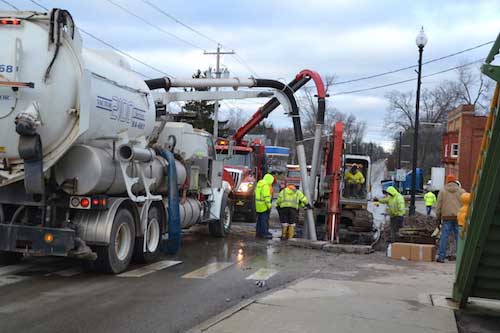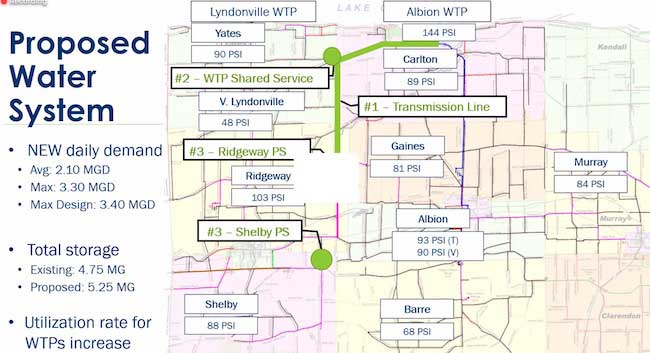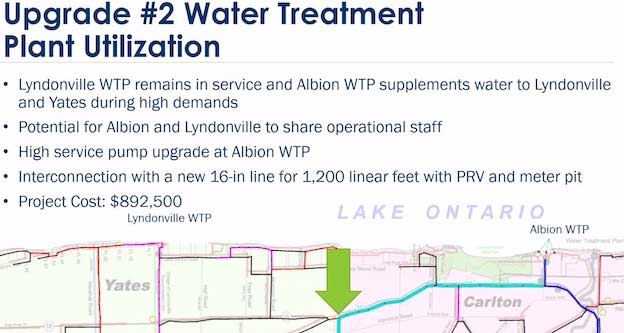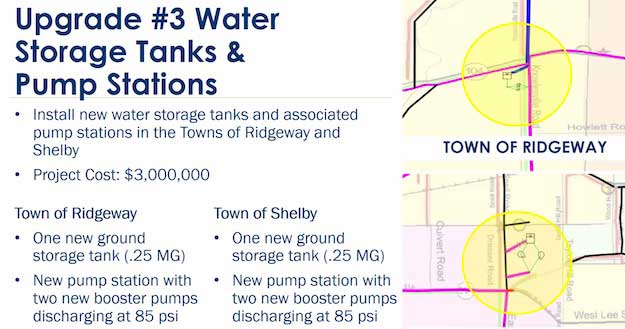$12 million water project pitched for Orleans County
Project would add new transmission line from Albion water plant to Ridgeway, 2 new water tanks in western Orleans, and interconnection between Albion and Lyndonville plants

File photo by Tom Rivers: The Albion Department of Public Works worked on Jan. 1, 2019 to repair a leak to its main transmission line on Main Street (Route 98). A consultant is suggested a second transmission main be constructed from the Albion water plant, with the new one providing service for Shelby and Ridgeway.
A firm that looked at ways to improve the water system in Orleans County is suggesting an $12 million upgrade in phase 1.
A second phase at $6 million would bring the total costs to $18 million.
The projects would increase water capacity in the county, improve water pressure and fire flows, and keep more water revenue in the county, instead of to outside suppliers.
That added revenue for more in-county water revenue, as well as expected grant funding for the project, would cover the cost for the project, the Wendel engineering firm told municipal officials.
That project would also would have the added benefit of a lower bulk water rate for many of the towns.
“I think you will find the opportunity here is extraordinary and even historic for the county,” said Chuck Nesbitt, a regional manager for Wendel. “It’s a winner for this community.”
Nesbitt is also the former chief administrative officer for Orleans County before leaving that job after 14 years in December to join Wendel.
The firm presented the results of the study on Thursday evening during a Zoom meeting with local elected officials, and highway and water department leaders.
Gerald Summe, executive vice president of Wendel, and Brian Sibiga, an engineer with Wendel, joined Nesbitt in going over the study.
Sibiga said the current system is plagued by numerous dead ends in waterlines, low fire flows, weak water pressure in spots and a lack of redundancy in the main water transmission line for Albion. If that line on Route 98 went down there is another main line to feed the system.
The study included an inventory of water infrastructure in the county, as well as the personnel devoted to maintaining water lines and running water plants.
The study also looked at how new transmission lines could move water to spots in the county that would be ideal for economic development.
Wendel also looked for potential cost savings and efficiencies that will reduce costs and increase capacity.
The current water rates are not consistent among the towns, and “problematically high in some areas.” For example, Ridgeway and Shelby pay a $5.98 rate 1,000 gallons, which is more than double what most of the towns are paying.
Water suppliers
- The Village of Albion is currently the main water provider in central Orleans with its water plant on Wilson Road by Lake Ontario in Carlton. Albion provides about 1.47 million gallons of water daily for 15,000 customers. Albion’s water plant is designed for 3 million gallons. Albion is utilizing about 49 percent of its capacity.
- Lyndonville produces about 200,000 gallons of water a day at a plant with a 400,000-gallon peak capacity, or a 50 percent utilization. That plant serves about 2,200 customers.
- The also use about 460,000 gallons a day from other users — the Niagara County Water District for western Orleans and Monroe County Water Authority in eastern Orleans.
The study focused on how to better utilize and safeguard two water suppliers in the county – Albion and Lyndonville.
Wendel is suggesting an $18 million project with three main capital initiatives for phase 1 that would increase water pressure and fire flows, and also provide more revenue for in-county water suppliers. That revenue would help reduce the overall per-gallon water cost for the towns, and also pay for the capital projects (which would be eligible for state and federal grants).
The project also would give Albion another main transmission line to feed the water districts, instead of relying solely on the Route 98 main.
Phase I: $12 million

These slides are screen shots from a presentation on Thursday by the Wendel engineering firm. This slide shows a map of the county include an outline for a 10-mile tranmsission line in phase 1. It also shows the water pressure in the towns if the project proceeds.
Project 1: 10-mile transmission line from Carlton, down Route 18, south on Townline Road to Route 104 near Kenyonville Road.
Project cost: $8.4 million
Proposed benefits:
- Supplies water to western/southern side of Orleans County
- Improves the water flow
- Gives secondary route to feed water to Barre and Village of Albion, by coming through Shelby
- Provides and improves service to towns of Yates, Shelby and Ridgeway
- Reduces water costs in supplied communities
Project 2: Interconnection line at 1,200 feet that would allow Albion to supplement water to Lyndonville and Yates.
Besides the waterline, project would include high-service pump upgrade at Albion water plant, and pressure-reducing valve and meter pit.
Project cost: $892,500
Proposed benefits:
- Lyndonville’s water treatment plant would remain in service and Albion’s plant would supplement water to Lyndonville and Yates during high demands. Often farmers could use more water for irrigation and would pay for it, but Lyndonville’s system is maxed out at about 200,000 gallons per day. The interconnection would allow for more water to be sold locally and would help farmers boost the quality of their crops.
- The project would increase water sales for Albion, reduce overall water-per-gallon costs, and improve water quality through interconnections. The regional approach would likely lead to more grants for the water projects.
- Albion and Lyndonville should also consider sharing operational staff. Albion already has some of its sewer plant employees helping to run the sewer plants in Holley and Elba. Albion could also provide some personnel to help with Lyndonville’s system.
Project 3: Water storage tanks and pump stations in Ridgeway and Shelby
Ridgeway and Shelby each would have a new 250,000 gallon water storage tank, and a new pump station with two booster pumps discharging at 85 PSI (pound-force per square inch).
This project would increase water pressure in Ridgeway from 80 to 103 PSI, to 88 PSI in Shelby and from 55 to 68 PSI in Barre. The pressure would also improve in parts of central Orleans, going from 60 to 89 PSI in Carlton and 70 to 90 PSI in Albion.
The projects would increase the demand for water produced by Albion and Lyndonville to 2.1 million gallons a day, with capacity remaining for another 1.2 million gallons. The two new 250,000-gallon storage tanks would boost storage capacity from 4.75 million gallons to 5.25 million.
Project cost: $3,000,000
Proposed benefits:
- Increase in regional revenue
- Increase in water supply by average 344,000 gallons a day. Albion water plant utilization would increase from current 49 percent of capacity to 61 percent.
- Improve regional water infrastructure
- Communities would see increase in water pressure, increase in available fire flow and additional storage for Shelby, Ridgeway and Barre.
Outside of Phase 1, the Village of Albion is already working to upgrade its water plant. The village is undertaking a $3,250,000 improvement project.
The project scope includes chemical and ventilation system improvements, clarifier system rehabilitation, filtration system rehabilitation, bolster pump station No. 1 improvements, miscellaneous building repairs and transmission main improvements along Route 98.
Phase 2 project to expand capacity of Albion water plant, $6 million
After phase 1 is complete, Wendel said Albion and the partner municipalities should consider a phase 2 project that would increase the capacity at the Albion water plant from 3 million gallons and 4.5 million.
That $6 million project would involve a high-service pump station upgrade, filtration upgrade, sedimentation improvements, main building expansion, and associated electrical, mechanical and structural upgrades as well as a new SCADA system (supervisory control and data acquisition) to help monitor and operate the water plant.
The consultants say the town water districts in Albion, Barre, Carlton, Gaines, Murray, Shelby and Ridgeway all currently pay $1.2 million annually for water. (This doesn’t count Murray’s water from the Monroe County Water Authority.)
The Village of Albion provides 621,975 of those gallons per day and the Village of Lyndonville’s water plant provides 112,000 gallons per day to customers in Yates.
The Village of Albion sells the water in a bulk rate to the towns for $2.96 per 1,000 gallons. Lyndonville bills Yates a $2.45 rate. Shelby and Ridgeway are charged $5.98 for water they buy from the Village of Medina, which gets its water from the Niagara County Water District.
Wendel said the project would allow Albion to lower its bulk rate to the towns by 30 cents to $2.66 per 1,00 gallons. That would be less than half of what Ridgeway and Shelby are currently paying. Yates could continue with its $2.45 rate paid to Lyndonville.
That reduced rate would save water customers about $240,000 a year in what they are currently paying, Wendel said.
‘Our water system is old. It’s aging. We’re band-aiding when we need to. We’re spending a lot of money operating the way we are now.’ – John Papponetti, Orleans County DPW superintendent
Sibiga, the Wendel engineer, said the municipal leaders should also look to loop districts to remove dead-ends. That would also improve water pressure and quality, and reduce the need for frequent flushing.
He said the additional transmission line from the Albion plant should be considered a high priority.
“A failure could really be catastrophic,” he said a break in the main transmission line. “There is some room for improvement with investment.”
With the plan proposed by Wendel, Albion and Lyndonville would continue to own their water plants, but the towns would each get a vote in a regional water system administrative board that would guide investments and water supply contracts. Each community would get a vote on how the system operates.
That could include having designated personnel for the water system, rather than having each municipality’s highway or DPW workers also have to run the water systems.
The regional approach would significantly increase the chances for federal and state grants, which would help Albion and Lyndonville with funding to upgrade the water systems.
“This would increase capacity for future developments, whether residential of business development,” Sibiga said about the proposed project. “Having large quantities of potable water is critical for our region to compete, and there would be an anticipated decrease in cost to users.”
The Wendel officials asked the municipal leaders to consider the suggestions of the study and work towards an agreement or memorandum of understanding on how to proceed.
Nesbitt said the regional approach would be a big benefit to the local municipalities.
“It would create future opportunities for increased sales and service,” he said.
John Papponetti, the county’s DPW superintendent, said the proposed projects would address many deficiencies in the water system. Papponetti also is an Albion firefighter. His father, Harry, is the Albion fire chief.
“Many of new districts going in that are dead ends and barely meet fire flow standards,” John Papponetti said.
The new transmission line “would be a major, major benefit for the entire area,” he said.
“Our water system is old,” Papponetti said. “It’s aging. We’re band-aiding when we need to. We’re spending a lot of money operating the way we are now.”







































































